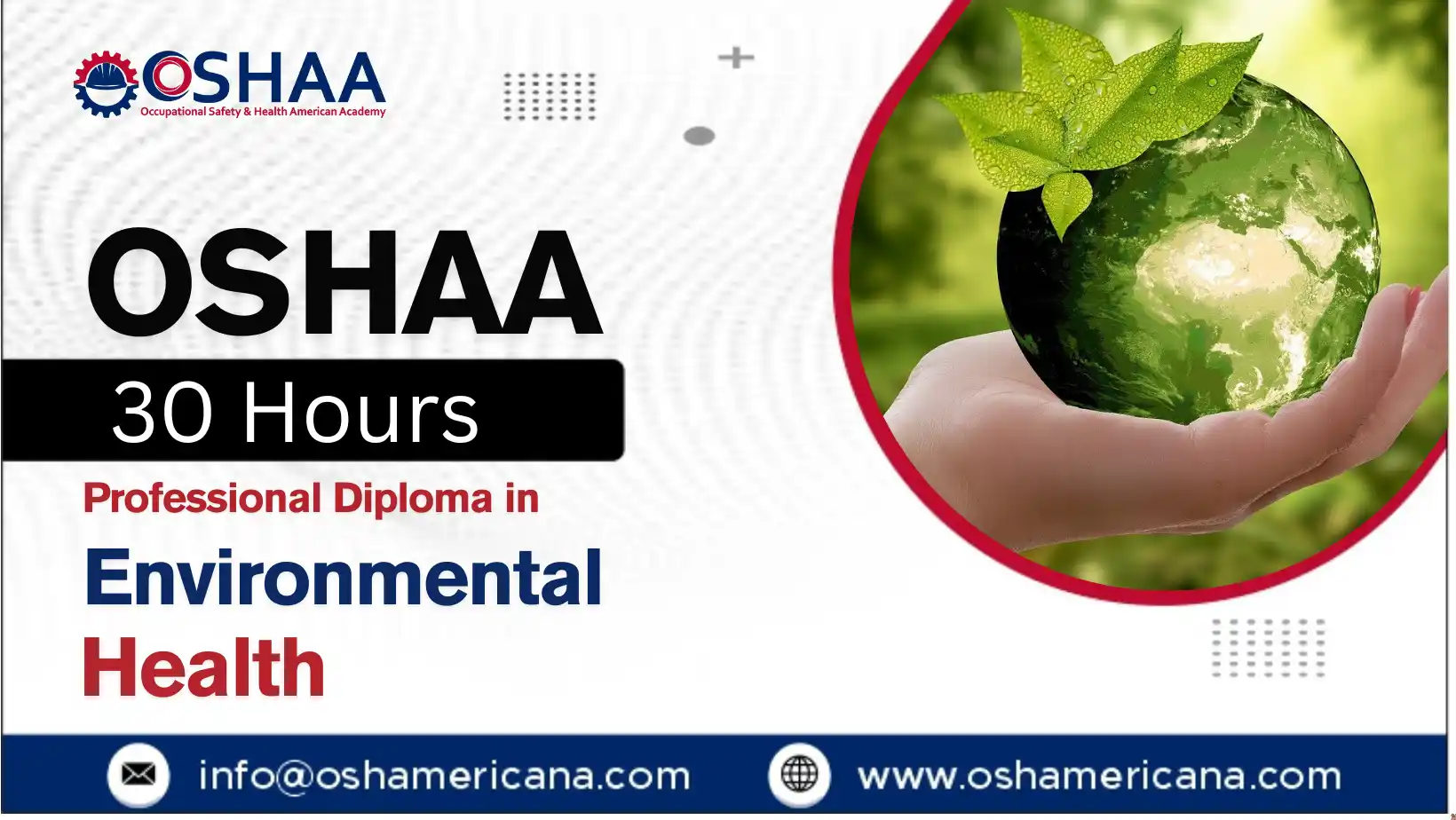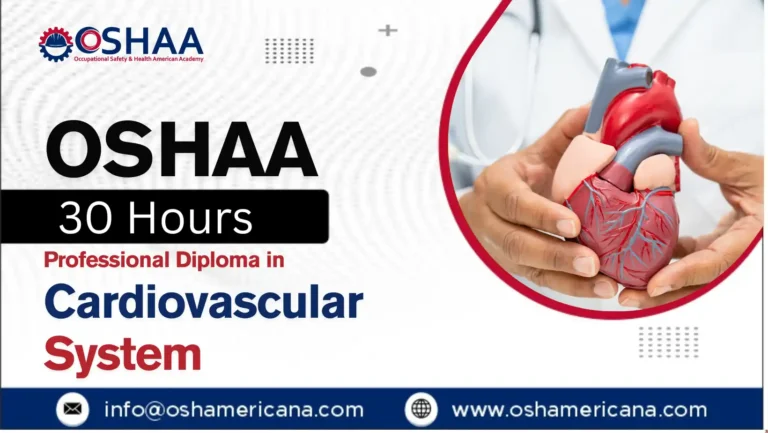Environmental health plays a crucial role in ensuring the health and well-being of individuals and communities. With increasing awareness of the impact of environmental factors on public health, professionals in this field are in high demand. The OSHAA 30-Hours Professional Diploma in Environmental Health is a comprehensive course designed to equip individuals with the knowledge and skills necessary to tackle contemporary environmental health challenges.
The OSHAA 30-Hours Professional Diploma in Environmental Health is a specially designed program that provides an in-depth understanding of key environmental health principles and practices. It covers essential topics such as environmental hazards, legislation, risk assessment, sustainable practices, and pollution control. This diploma is aimed at professionals in public health, environmental services, and related fields who wish to enhance their expertise and contribute to building healthier, more sustainable environments.
Environmental health professionals play a vital role in safeguarding communities by addressing environmental factors that impact public health. With rapid urbanization, industrialization, and climate change, the need for qualified professionals in this field has never been greater. The OSHAA 30-Hours Professional Diploma in Environmental Health is the ideal starting point for individuals who want to advance their careers or enter the field of environmental health.
The OSHAA 30-Hours Professional Diploma in Environmental Health is a valuable qualification for anyone looking to advance their career in the environmental health field. It provides practical skills and comprehensive knowledge about the key issues affecting public health, environmental hazards, and sustainable practices. Whether you’re a current professional looking to enhance your qualifications or someone new to the field, this diploma will equip you with the tools needed to make a meaningful impact on environmental health and safety.
OSHAA 30-Hours Professional Diploma in Environmental Health
Study Units
Learning Outcomes
Introduction to Environmental Health (3 hours)
- Understand the key concepts and principles of environmental health.
- Learn the role of environmental health professionals in promoting public health.
- Gain knowledge of how environmental factors impact human health and well-being.
- Familiarise with the core areas of environmental health practice, including air and water quality, waste management, and more.
Environmental Hazards and Risk Assessment (4 hours)
- Identify and categorise common environmental hazards such as biological, chemical, and physical threats.
- Understand how to assess and measure environmental risks.
- Learn how to evaluate the impact of environmental hazards on public health.
- Develop skills to implement risk management strategies to mitigate environmental risks.
Legislation and Environmental Health Policies (4 hours)
- Gain an understanding of UK and international environmental health legislation.
- Learn about the policies that govern environmental health practices and standards.
- Understand the regulatory frameworks that ensure environmental health and safety.
- Explore the role of environmental health professionals in enforcing and complying with laws.
Pollution Control and Waste Management (4 hours)
- Understand the different types of pollution and their effects on human health and the environment.
- Learn about pollution control methods and technologies used in industry and urban areas.
- Study waste management strategies including recycling, disposal, and reduction techniques.
- Develop skills to design and implement pollution control programs in various settings.
Sustainable Practices and Environmental Sustainability (4 hours)
- Understand the concept of sustainability and its importance in environmental health.
- Learn about sustainable practices and their role in reducing environmental impacts.
- Explore renewable energy sources and their application in environmental health.
- Gain knowledge on strategies for promoting sustainable living in communities.
Water, Air Quality, and Noise Pollution (4 hours)
- Learn about the importance of water quality and the methods used to monitor and improve it.
- Study air pollution sources and health effects, and how to control air quality.
- Understand the impact of noise pollution on public health and the environment.
- Develop techniques for managing and mitigating water, air, and noise pollution in urban and industrial areas.
Occupational Health and Safety (4 hours)
- Understand the principles of occupational health and safety as they relate to environmental health.
- Learn about the workplace hazards and their potential impacts on health.
- Gain knowledge on how to manage and control workplace risks to ensure safety.
- Explore the role of environmental health professionals in implementing workplace safety measures.
Emergency Preparedness and Response to Environmental Disasters (3 hours)
- Understand the principles of emergency preparedness in the context of environmental health.
- Learn how to develop and implement emergency response plans for environmental disasters.
- Gain knowledge of the immediate actions required to manage environmental health risks during disasters.
- Study case scenarios of environmental disasters and the lessons learned in disaster response and recovery.
- In-depth Knowledge: The course offers a comprehensive understanding of key environmental health principles, from pollution control and waste management to emergency preparedness. Participants will gain a thorough grounding in the factors affecting public health and how to address them.
- Practical Application: The diploma equips participants with practical skills that can be immediately applied in real-world scenarios, making it an invaluable resource for professionals looking to enhance their effectiveness in managing environmental health risks.
- Career Advancement: With the increasing focus on environmental sustainability and public health, this qualification will help boost your career prospects. Graduates can apply for roles in governmental bodies, non-governmental organisations, healthcare settings, and private sector industries.
- Professional Recognition: Earning this accredited diploma enhances your credibility in the field of environmental health. It provides professional recognition, helping you stand out in a competitive job market.
- Wide-ranging Career Opportunities: The course opens doors to various roles in environmental health, including health and safety officers, environmental consultants, policy advisors, and sustainability experts, allowing professionals to explore diverse career paths.
- Regulatory Understanding: Participants will gain an in-depth knowledge of UK and international environmental health legislation, ensuring they stay compliant with regulatory standards and contribute to creating safer, healthier environments.
- Focus on Sustainability: The diploma places a strong emphasis on sustainability, giving participants the tools and knowledge to incorporate sustainable practices into their professional work, contributing to long-term environmental health improvements.
- Improved Public Health Impact: By completing this course, participants will be equipped to directly contribute to improving community well-being by addressing environmental risks, leading to healthier and safer environments for the public.
- Up-to-date with Industry Trends: The course content is regularly updated to reflect the latest environmental health challenges, trends, and technologies, ensuring participants are well-prepared to handle modern environmental issues.
- Networking Opportunities: Through the course, participants will connect with professionals in the environmental health field, creating networking opportunities for collaboration, learning, and career growth.
The OSHAA 30-Hours Professional Diploma in Environmental Health is ideal for a variety of professionals looking to deepen their expertise in environmental health and safety. This course is particularly beneficial for:
- Environmental Health Professionals: Those currently working in the field who want to expand their knowledge and enhance their qualifications in environmental health practices, legislation, and risk management.
- Health and Safety Officers: Individuals responsible for overseeing health and safety regulations in various industries, seeking to integrate environmental health concerns into their broader role.
- Public Health Professionals: Those working in public health, looking to understand how environmental factors affect public well-being and how to manage these risks effectively.
- Sustainability Managers: Professionals focused on sustainability initiatives in businesses, organisations, or communities, who want to develop expertise in managing environmental health risks while promoting sustainability.
- Occupational Health and Safety Experts: Those working in occupational health who aim to expand their knowledge to address environmental health risks in the workplace.
- Government and Policy Advisors: Individuals in local or national government, as well as policy advisors, who need to understand environmental health issues for the development and implementation of public health policies and regulations.
- Environmental Consultants: Consultants who specialise in providing guidance on environmental issues for organisations, ensuring compliance with environmental health regulations and promoting safer practices.
- Individuals Aspiring to a Career in Environmental Health: Anyone looking to enter the field of environmental health, with no prior experience, who seeks foundational knowledge and practical skills for a successful career in this sector.
- Community Health Workers: Those working in community-based organisations who need to understand environmental risks and develop strategies to improve public health and safety.
- Corporate Sustainability Teams: Employees working within companies on corporate social responsibility (CSR) and sustainability initiatives, seeking to incorporate environmental health management into their corporate strategies.
This course is suitable for professionals from a wide range of sectors who want to make a positive impact on public health and environmental sustainability.







